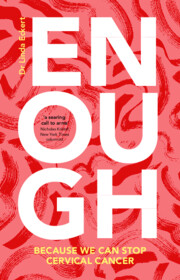Book contents
- Enough
- Reviews
- Enough
- Copyright page
- Dedication
- Contents
- Figures
- The Calling
- Part One A Preventable Cancer
- Part Two The Science behind Cervical Cancer
- 4 The Dangerous Clout of a Sexually Transmitted Virus
- 5 The Power of Prevention
- 6 The Toll of Treatment
- 7 Gasoline on the Fire: When HIV Meets HPV
- Part Three The Prevention Problem
- Part Four Getting to Enough
- Acknowledgments
- Reader Resources
- References
- Index
4 - The Dangerous Clout of a Sexually Transmitted Virus
from Part Two - The Science behind Cervical Cancer
Published online by Cambridge University Press: 11 January 2024
- Enough
- Reviews
- Enough
- Copyright page
- Dedication
- Contents
- Figures
- The Calling
- Part One A Preventable Cancer
- Part Two The Science behind Cervical Cancer
- 4 The Dangerous Clout of a Sexually Transmitted Virus
- 5 The Power of Prevention
- 6 The Toll of Treatment
- 7 Gasoline on the Fire: When HIV Meets HPV
- Part Three The Prevention Problem
- Part Four Getting to Enough
- Acknowledgments
- Reader Resources
- References
- Index
Summary
HPV is the world’s most common sexually transmitted infection: most of us have already acquired it by the time we become adults. While HPV is also the key source of cancer, in theory, it should pose little threat. Medical science already possesses a superior means of tracking, monitoring, and stopping this virus from becoming cervical cancer, and the body carries a natural ability to clear it. And yet, it’s society’s hang-ups about HPV – the stigma of acquiring it through sexual contact – that often get in the way of rationally addressing cervical cancer through widespread vaccination and screening. To encourage people to embrace these two highly effective means of prevention, we must dispel the mysteries of HPV and embrace its ubiquity. If we want to eliminate a cancer caused by a common viral infection, we need to take a closer look at the misguided notions associated with HPV – fears that only foster its spread – and be prepared to defuse them.
Keywords
- Type
- Chapter
- Information
- EnoughBecause We Can Stop Cervical Cancer, pp. 41 - 49Publisher: Cambridge University PressPrint publication year: 2024

